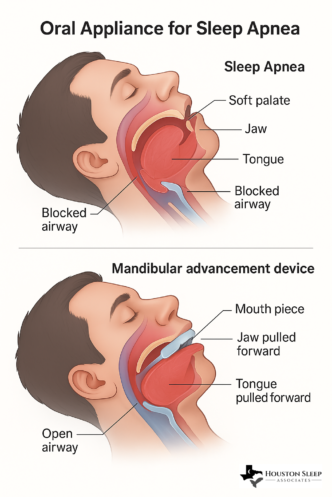Oral Appliance Therapy
CPAP Alternative | Oral Appliance Therapy
While CPAP (continuous positive airway pressure) is highly effective in treating sleep-related breathing problems, specifically sleep apnea, only some are comfortable using it. Fortunately, several alternatives to CPAP machines are available, and one popular one is oral appliance therapy. In oral appliance therapy, your dentist will provide you with an appliance custom-made just for you to wear all night. This ensures your breathing airway remains open all night and you sleep peacefully.
Who Can Get Oral Appliance?
OAT is given to people diagnosed with mild to moderate obstructive sleep apnea or primary snoring. It is also recommended for those who cannot tolerate it, which involves wearing a mask over the mouth and nose all night. While CPAP therapy is highly effective, its design is CPAP therapy, w bulky, uncomfortable, and difficult to tolerate. People who are claustrophobic or do not like the machine's noise often prefer OAT.
Mandibular Advancement Devices (MADs) and Tongue Retaining Devices (TRDs) are the two main types of devices. MADS is made to be used by gently moving your lower jaw forward and preventing your tongue or soft tissues from collapsing your airway. TRDS, on the other hand, works by holding your tongue in place to keep that airway clean and help you breathe more easily. Both types are equally effective, and your dentist will decide the best fit for you.
The process of getting an oral appliance from us is straightforward. You will visit us, and we will check whether you need one. After making sure you are a perfect fit, we will fabricate a custom-made appliance just for you to fit your teeth perfectly. Once fitted, this appliance helps reduce airway obstruction by keeping your jaw forward or stabilizing your tongue.

Travel CPAP alternative | Oral Appliance Therapy
While CPAP (Continuous Positive Airway Pressure) is highly effective in treating your sleep-related breathing problems, specifically sleep apnea, those who are struggling with obstructive sleep apnea (OSA) might be advised to take CPAP therapy. CPAP is an excellent solution for OSA, but it’s not always convenient, especially when moving. CPAP is a bulky machine, and traveling with it can be more complicated than you think. It takes space and power to work. Taking your CPAP machine with you on your vacations makes it impossible. In these times, oral appliance therapy is handy, offering a perfect solution to your problems. It is lightweight and requires no electricity, making it an ideal solution to take with you to maintain your sleep apnea treatment regimen.
Oral appliances come in two forms: mandibular advancement devices (MADs) and tongue-retaining devices (TRDs). They are custom-made just to fit inside your mouth to reposition your lower jaw or keep your tongue in place to keep your airway open while you sleep. Unlike CPAP machines requiring a complex setup with masks, tubes, power, and consistent airflow, oral appliances are made small enough to fit into your pocket. This makes them extremely easy to travel with. Whether you are flying, camping, or overnight at someone’s place, this is your solution.
CPAP Alternative Conclusion
Oral Appliance Therapy is now considered a game changer for people who are struggling with sleep apnea and snoring. It’s easy to use, simple, portable, and can significantly improve sleep quality. With OAT, you do not need to worry about finding power and carrying complex setups. OAT is made to fit into your pocket and can be used anywhere without adding extra hassle to your trip. Contact us if you’re new to sleep apnea treatment or seeking an alternative to CPAP. Get your consultation done, and we will see if it fits you well!
For Physicians: Refer Patients for Sleep Apnea Treatment
Houston Sleep Associates understands your frustration when patients cannot tolerate a CPAP, and we are here to help. Our first encounter with patients involves an in-depth discussion to understand why they are not using their CPAP. We also confirm that the patient is aware of the dreadful consequences of discontinuing CPAP use. Finally, we stress that they consider a renewed effort to adapt to CPAP. If that is impossible, we will proceed with the oral appliance evaluation.
Find Us
You can also email or fax us at any time, and someone will contact you shortly to accommodate your request. Please use the map below to plan your route to our dental office.
Phone: 281.378.4999
Fax: 713.522.7664
Address
2150 Richmond Ave. #101 Houston, TX 77098

